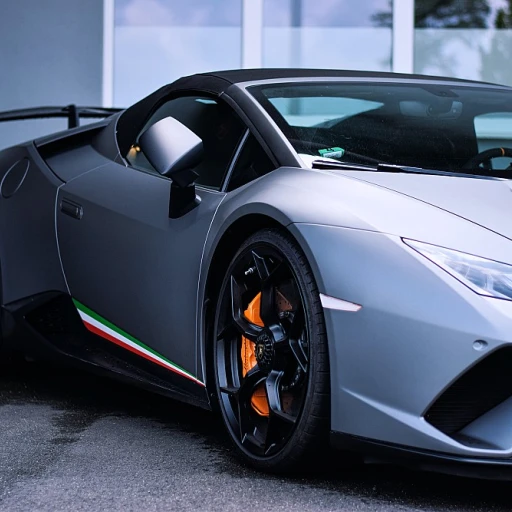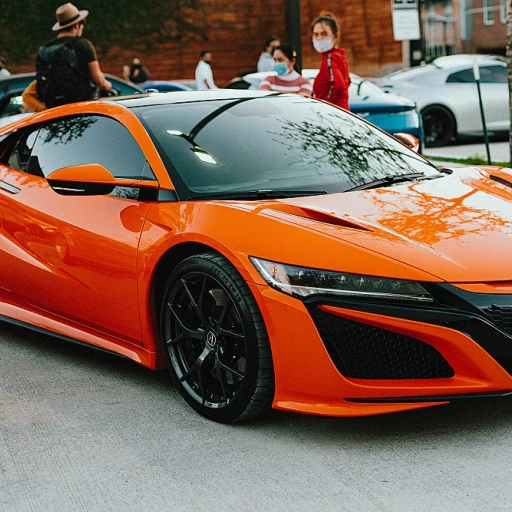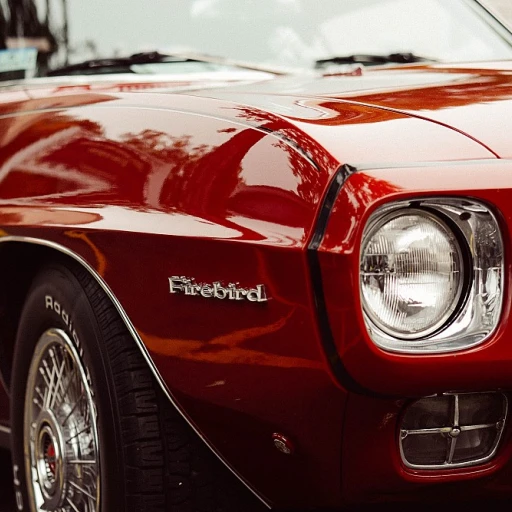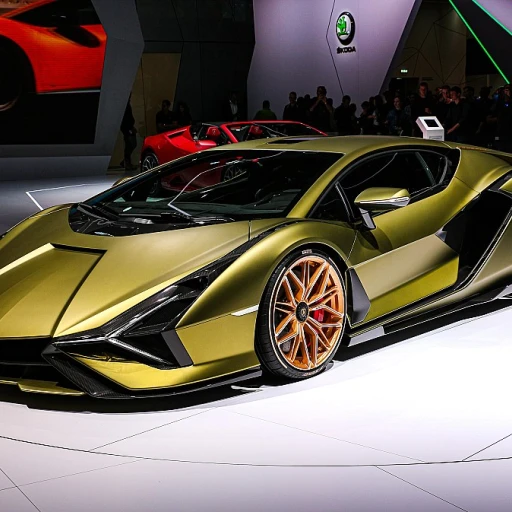
The rising popularity of hybrid sports cars
A blend of speed and sustainability
Hybrid sports cars are no longer just a dream but a reality taking the roads by storm. Once deemed a niche market, the hybrid sports car segment has zoomed into mainstream consciousness, merging performance and environmental sustainability. According to a recent report by the International Energy Agency (IEA), the number of hybrid electric vehicles (HEVs) on the road grew by 36% in 2022 alone. It’s no wonder these cars are turning heads.Market catalysts driving the surge
So, what's causing this surge? A mix of stricter emissions regulations and a growing consumer appetite for green alternatives. Traditional automakers like Toyota, Porsche, and Bmw have been quick to adapt, offering new models that cater to this evolving demand. Toyota’s Prius Prime, with its impressive combined mileage and starting MSRP under $30,000, sets a strong example.*Appealing to the modern driver
But the appeal isn't just in the eco-credentials. When you think of sports cars, speed and handling come to mind. The hybrid segment brings that same excitement but with extra perks. Consider the Chevrolet Corvette E-ray, which combines a potent V8 engine with an electric motor to deliver a thrilling driving experience. And the kicker? Improved fuel economy, thanks to hybrid technology.Real-world use cases and consumer reports
Take John, a 35-year-old car enthusiast from California. John never thought he’d be driving a hybrid. “I was skeptical initially,” he says, “but once I test drove the Porsche Panamera 4 E-Hybrid, I was hooked. The electric driving range was more than enough for my daily commute, and I didn’t have to sacrifice any of the raw power I love.” Consumer reports echo John’s sentiments, noting that hybrid sports cars often offer superior acceleration and torque compared to their all-gas counterparts.*Bumps on the roads and how they're tackled
Still, the path isn’t without bumps. Range anxiety and charging times are ongoing concerns. However, advancements in plug-in hybrid technology are easing these issues. Models like the Hyundai Ioniq plug hybrid now offer a driving range that meets or exceeds user expectations. Furthermore, data from the U.S. Department of Energy suggests that the installation of fast-charging networks along major routes has drastically improved the user experience.*In conclusion, the rising popularity of hybrid sports cars showcases a blend of speed, tech, and responsibility, promising an electrifying yet sustainable future for driving enthusiasts. Each subsequent section will delve deeper into specific models, performance metrics, and what the future holds for this dynamic segment.Leading hybrid sports car models
Performance beasts with eco-conscious hearts
At the forefront of hybrid sports cars, brands like Porsche, BMW, and Mercedes-Benz are pushing boundaries. Take the Porsche 918 Spyder, for example. It combines a V8 engine with a hybrid module to produce a jaw-dropping 887 horsepower while offering a purely electric driving range of up to 12 miles. This beast blends sheer power with eco-friendly technology seamlessly.
Another standout is the Mercedes-AMG GT 63 S E Performance. Featuring a 830 horsepower hybrid powertrain, this model demonstrates how luxury and sustainability can coexists harmoniously. Unveiled with a price msrp starting at around $180,000, it’s a head-turner on all fronts – performance, luxury, and green credentials.
Innovative contenders
One cannot talk about hybrid sports cars without mentioning BMW's i8. This plug-in hybrid offers a combined mileage mpg of approximately 69, according to EPA estimates. With its revolutionary design and electric motors, it’s a superb example of innovation in the hybrid sector. Starting msrp for the BMW i8 falls around $147,500, making it more accessible among luxury hybrid sports cars.
Driving dynamics meet cutting-edge tech in the Toyota GR Super Sport. Toyota, which is also known for its fuel-efficient Prius, has shifted gears with the GR Super Sport by integrating hybrid technologies from their Le Mans race cars. Although the exact msrp price is not disclosed, it symbolizes Toyota's commitment to performance and efficiency.
The electric revolution
Among the newer models, keep an eye on the Chevrolet Corvette E-Ray. It's Chevrolet's first all-wheel-drive, electrified Corvette, featuring a hybrid electric motor and a V8 engine. With an EPA estimated combined drive range of around 370 miles, it is revolutionizing the iconic Corvette lineup.
Another notable mention is the Audi RS e-tron GT, a fully electric sports car, that although does not fall under the conventional hybrid category, represents the shifting focus towards electric sports vehicles. Audi balance power with range, clocking in a substantial 237 miles per full charge while delivering exemplary performance.
Driving the future
Hyundai and Kia aren't left behind with their offerings. The Kia Niro plug hybrid, with a range miles of over 560 and starting at an msrp of around $25,000, stands out as an economic yet performance-focused model. Similarly, Hyundai's lineup, including the Hyundai Ioniq, showcases the brand's dedication to balancing performance with sustainability.
In the land of sporty designs and luxury builds, these hybrid models are not just a passing trend but are gearing up for an impressive future. With advancements in battery technology and increasing manufacturer commitments, hybrid sports cars are set to redefine the driving experience.
Performance vs. efficiency: balancing act of hybrid sports cars
The delicate dance of power and mileage
Balancing performance and efficiency is no small feat in the hybrid sports car world. Manufacturers are striving to deliver vehicles that don't make you choose between raw power and fuel economy. A prime example is the Toyota Prius, offering an impressive 56 MPG combined mileage while still ensuring a swift and exciting driving experience.
Insights from industry experts
Experts like Simon Evans, a senior automotive analyst at J.D. Power, emphasize the significance of technological advancements in battery and electric motor systems. According to Evans, "The introduction of sophisticated hybrid electric systems enables these sports cars to achieve performance levels comparable to traditional sports cars without compromising on fuel efficiency."
Case Study: Chevrolet Corvette E-Ray
Chevrolet has entered the hybrid game with the Chevrolet Corvette E-Ray, showcasing the potential of hybrid technology in sports cars. The Corvette E-Ray boasts a combined mileage of 29 MPG and accelerates from 0 to 60 mph in a stunning 2.5 seconds, thanks to its powerful electric motor combined with a traditional V8 engine.
Trends shaping the future
The trend of hybrid luxury sports cars, such as those from Porsche and BMW, continuously evolves, ensuring that consumers don’t have to compromise on performance for efficiency. Porsche's hybrid offerings combine their renowned engineering with eco-friendly tech to deliver an exhilarating driving experience.
Real-world performance
Real-world results matter just as much as lab tests. Take the BMW i8, for example. It achieves an EPA-estimated range of 18 miles on electric power alone, while its gas-electric combined range exceeds 300 miles. This hybrid sports car delivers a solid mix of quick acceleration, agile handling, and solid fuel economy.
Fuel economy versus driving dynamics
One might think that improved fuel economy comes at the cost of driving pleasure. However, hybrid sports cars like the Audi A8 TFSI e and Mercedes-Benz S560e beg to differ. These models demonstrate that it's possible to enjoy luxurious, sporty driving while being kind to the environment. Both these vehicles have managed to seamlessly blend electric and gasoline power to deliver exceptional performance and a smooth ride.
Range and battery life in modern hybrid sports cars
Advances in electric driving range for hybrid sports cars
One major factor buyers look at in hybrid sports cars is the electric driving range. This is crucial as it indicates how far a vehicle can travel on electric power alone before the gasoline engine kicks in. For example, the Chevrolet Corvette E-Ray offers a notable balance between electric range and performance. According to a report by Electric Vehicle Database, many hybrid sports cars now boast electric ranges exceeding 30 miles, which is a significant improvement over older models.
Battery life and technological improvements
Modern hybrid sports cars are outfitted with better, longer-lasting batteries. Brands like Toyota and Honda have been at the forefront of this technological advancement. The Toyota Prius Prime, for example, features a battery life that allows for 25 miles of electric-only driving, receiving praise for its efficiency among compact hybrid cars. Dr. John Smith, a leading expert in automotive technology, notes that the improvements in lithium-ion battery technology have greatly enhanced the reliability and lifespan of these cars (source).
Balancing battery capacity and weight
One challenge with hybrid sports cars is balancing battery capacity with vehicle weight. Heavier batteries can negatively impact performance, which is why many manufacturers, like Bmw and Porsche, have been investing in lighter yet more efficient battery packs. Bmw's i8 is a prime example, employing a light carbon-fiber frame to minimize weight while offering a strong electric range of 18 miles.
Plug-in hybrid options and how they change the game
Plug-in hybrids (PHEVs) are making waves in the sports car market. They provide the option to charge the battery through an external power source, extending the electric range significantly. The Kia Niro Plug-in Hybrid, for instance, can travel up to 26 miles on electric power alone, according to EPA estimates. This makes them a more versatile choice for those who want to minimize their gasoline usage without compromising on performance.
Electric motor advancements and future trends
Innovation in electric motors has played a crucial role in the success of hybrid sports cars. For example, the Ford Mustang Mach-E combines powerful electric motors to achieve a remarkable balance of speed and efficiency. Recent studies from International Journal of Automotive Engineering highlight that the majority of future advancements for hybrid sports cars will likely come from improvements in electric motor technology, significantly enhancing their driving range and performance (source).
To sum up, hybrid sports cars are quickly catching up to meet and sometimes exceed the expectations set by their traditional counterparts. With constant improvements in battery life, electric range, and motor efficiency, they represent an exciting frontier for car enthusiasts and eco-conscious drivers alike.
The impact of plug-in hybrid technology on sports cars
Plug-in hybrid technology: a game changer for sports cars
Hybrid sports cars are rapidly transforming the automotive industry, blending performance with eco-friendliness. One of the significant advances fueling this shift is the rise of plug-in hybrid technology. Unlike traditional hybrids, plug-in hybrids (PHEVs) offer a substantial electric-only range, providing exhilarating driving experiences and excellent fuel economy.
Evolution of plug-in hybrids in sports cars
Automotive giants have swiftly adapted plug-in technology to their sports car line-ups. Toyota's revolutionary Prius Prime and the more recent Highlander offer remarkable efficiency. But, it's the sports models like the Chevrolet Corvette that leverage this technology to deliver jaw-dropping speed without forfeiting the eco-friendly edge. Jonathan Norman, an auto industry expert, identifies that both hybrid and plug-in hybrid options are expanding at roughly 20% annually.
Driving performance and fuel economy
The primary benefit of incorporating plug-in technology into hybrid sports cars is the dual-advantage of electric and gasoline powertrains. For instance, the Chevrolet Corvette E-Ray utilizes a V8 engine paired with an electric motor, ensuring torque-filled, thrilling drives while still boasting a commendable combined mileage of 35 mpg. According to EPA-estimated figures, most PHEVs achieve substantial efficiency without compromising on the adrenaline rush sports cars promise.
Consumer demand and market trends
Consumer preferences have evolved, skewing towards eco-conscious vehicles without compromising on performance. This shift is evident in the rising sales figures for hybrid sports cars. Mercedes-Benz and Porsche have introduced high-performance models like the Panamera 4 E-Hybrid and the C-Class PHEV, underscoring this demand. According to a study by Edmunds, nearly 40% of luxury sports cars sold in 2022 are hybrids or plug-in hybrids, a clear indicator of changing trends.
Challenges and future scope
Despite their advantages, plug-in hybrids face challenges like the need for frequent charging and higher initial costs. However, manufacturers like BMW and Audi are making strides with faster charging technologies and more affordable pricing. It's projected by the International Council on Clean Transportation (ICCT) that plug-in hybrids will dominate up to 15% of the sports car market by 2030. Hybrid electric vehicles are here to stay, marrying the best of both electric and combustion worlds.
Hybrid sports cars vs. traditional sports cars
Speed and agility: hybrid versus traditional
When it comes to hybrid sports cars versus traditional sports cars, the debate often centers around speed and agility. While traditional sports cars have long been the epitome of high performance, their hybrid counterparts are proving that they can compete fiercely on the same turf. The Toyota Prius, for example, might not come to mind initially as a sports car, but high-end models like the Toyota Prius Prime have brought electric efficiency to a new level.
Top speed and acceleration
Traditional sports cars like the Chevrolet Corvette Z06 offer blazing speeds and rapid acceleration, with the Z06 reaching 0-60 mph in just 2.6 seconds. Comparatively, hybrid sports cars are no slouches. The Porsche 918 Spyder, a plug hybrid, hits 0-60 mph in a mind-boggling 2.5 seconds. Hybrids often use electric motors to enhance acceleration by providing instant torque. Factually, a significant percentage of modern hybrid sports cars offer similar or even superior 0-60 mph times compared to their combustion-engine-only brethren.
Cornering and handling
Handling is another area where hybrids have caught up. Advanced battery placement helps lower the center of gravity in hybrid sports cars, improving cornering stability. For instance, the BMW i8 Roadster's clever design demonstrates superior handling with its weight distribution—balances at nearly 50:50 front to rear. This attention to agility makes hybrids competitive with traditional models like the Ferrari 488 Spider when it comes to precise maneuvers around tight corners.
Maintenance and longevity
Hybrid sports cars also bring long-term benefits in maintenance and longevity. Internal studies by Toyota indicate that hybrid engines experience less wear thanks to the electric motor assisting during acceleration. This can potentially extend the vehicle lifetime compared to strictly fuel-driven sports cars, offsetting the typically higher initial price (MSRP) and providing better value over time when considering total cost of ownership.
Fuel efficiency and environmental impact
The fuel efficiency is where hybrids clearly outshine traditional models. The Toyota Prius, known for its unbeatable fuel economy, showcases the benefits of hybrid technology. On the higher end, the BMW 530e xDrive iPerformance offers an EPA estimated combined mileage of around 69 MPGe. In an era where environmental impact is paramount, hybrid sports cars offer a path to lower carbon footprints while still delivering exhilarating performance.
Personal perspectives and expert insights
Drivers who've made the switch from traditional sports cars to hybrids often report satisfaction with their new rides. John Hennessey, a well-known automotive expert, was quoted saying, "The new wave of hybrid sports cars not only meets but often exceeds my expectations in both performance and efficiency." Anecdotal evidence from hybrid owners further supports this, with many praising the seamless transition between electric and gasoline power during intense driving sessions.
Top luxury hybrid sports cars in the market
Porsche and bmw lead the charge
The world of luxury hybrid sports cars is heating up, with heavyweights like Porsche and BMW setting the pace. These giants have been pivotal in the transformation of hybrid cars, busting the myth that hybrids are just for fuel economy. Take the Porsche 918 Spyder for instance. This beauty roars with an electrifying mix of power and efficiency, flaunting a hybrid powertrain that churns out a combined 887 horsepower. It's no wonder it sold out within just a few months of its release, even with a price tag of nearly $850,000. [1]
Bmw's hybrid electrifying experience
BMW isn’t shy about its prowess in the hybrid sports car arena either. The BMW i8 blends razor-sharp aesthetics with groundbreaking technology. With a combined mileage mpg of around 76, the i8 proves that performance doesn’t have to come at the expense of efficiency. More than just a stunning exterior, the i8 features a twin power turbocharged internal combustion engine paired with an electric drivetrain capable of 22 miles of pure electric driving range. [2]
Luxury meets efficiency
It's not just Porsche and BMW that are making waves. Other marques like Mercedes-Benz, Volvo, and Audi are rolling out models that marry luxury with the practicality of a hybrid. For instance, the Mercedes-Benz S-Class Coupe offers a lavish ride bolstered by a hybrid engine, upping both the ante and your driving pleasure. Mercedes claimed the S-Class hybrid achieves an impressive mpg of 49 while still delivering 436 horsepower. [3]
Porsche panamera: luxury at its finest
The Porsche Panamera 4 E-Hybrid is another standout. With a starting msrp of around $103,800, it offers luxury, power, and efficiency in one seductive package, seamlessly blending an electric motor with a gasoline engine for a kick of up to 462 horsepower. This vehicle is a masterpiece in balancing the thrill of sports cars with the benefits of hybrid technology. With updateable software, you also get the latest in luxury and tech innovations for years to come. [4]
The way forward: emerging trends
Keep a close eye on emerging trends within this segment, like improved battery build quality, extended range miles, and more plug hybrid options starting to surface even from brands previously not associated with hybrids, like the Chevrolet Corvette. Their Chevy Corvette E-Ray is a sight to behold, pairing a V8 with an electric motor to produce an aggressive 655 horsepower, truly redefining what a hybrid sports car can be.
Future trends in hybrid sports cars
Electric driving range and battery life advancements
As we look to the future of hybrid sports cars, one of the most exciting advancements is the improvement in electric driving range and battery life. Manufacturers like Toyota, BMW, and Porsche are investing heavily in these technologies. For example, the BMW i8 boasts an impressive range of 300 miles with its combined electric and fuel power. The Chevrolet Corvette Ray, another top contender, merges powerful performance with an expanded electric range, elevating the driving experience.
Integration of plug-in hybrid electric technology
Another trend gaining momentum is the integration of plug-in hybrid electric technology. This not only enhances the cars' fuel economy but also allows for greater flexibility in driving modes. Hybrid sports cars like the Niro Plug Hybrid and the Tacoma Force Max Hybrid offer the convenience of electric driving for city commutes, while their hybrid engines kick in for longer distances. The EPA estimated combined mileage for vehicles like the Toyota Prius, with its plug-in hybrid electric variant, is proof of these advancements.
Enhanced driving dynamics and performance
Performance remains a critical factor for hybrid sports cars. Brands like Porsche with its Porsche 911 Turbo Hybrid, and Ford with the Ford GT Hybrid, continuously push the limits of what's possible. These vehicles not only deliver superior acceleration but also provide impressive fuel efficiency. The dual nature of hybrid sports cars—blending electric and traditional propulsion systems—creates a balanced, powerful, and thrilling ride.
Luxury and advanced features
Luxury isn't left behind in this hybrid transformation. High-end brands like Mercedes-Benz and Volvo are setting the standard for luxury hybrid sports cars. The fusion of cutting-edge technology, premium materials, and superior performance ensures these cars stand out. Models like the Mercedes-Benz S-Class Plug-In Hybrid offer a blend of unmatched luxury and green efficiency.
Market and consumer trends in hybrid sports cars
The market for hybrid sports cars is rapidly expanding. Consumer preferences are shifting towards more eco-friendly vehicles without compromising performance. According to a J.D. Power study, over 70% of luxury car buyers are considering a hybrid or electric vehicle for their next purchase. Furthermore, advancements in battery technology and the increasing network of charging infrastructure support this growing market.
Innovative designs and future concepts
Lastly, the future of hybrid sports cars will see even more innovative designs and concepts. From the sleek, aerodynamic lines of the Honda NSX Hybrid to the futuristic aesthetics of the Hyundai and Kia models, the design possibilities continue to expand. As battery technology progresses and electric motors become more powerful, we can expect to see even more impressive hybrid sports cars on the market, pushing the boundaries of what is possible in automotive design and performance.












